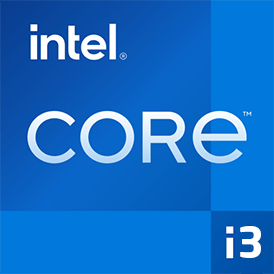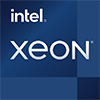
Intel Core i3-550 Benchmark, Test and specs
Last updated:
The Intel Core i3-550 has 2 cores with 4 threads and is based on the 1. gen of the Intel Core i3 series. The processor uses a mainboard with the LGA 1156 socket and was released in Q2/2010. The Intel Core i3-550 scores 489 points in the Geekbench 5 single-core benchmark. In the Geekbench 5 multi-core benchmark, the result is 1,170 points.

| Name: | Intel Core i3-550 |
|---|---|
| Family: | Intel Core i3 (205) |
| CPU group: | Intel Core i3 500 (4) |
| Architecture: | Clarkdale |
| Segment: | Desktop / Server |
| Generation: | 1 |
| Predecessor: | -- |
| Successor: | -- |
CPU Cores and Base Frequency
The Intel Core i3-550 has 2 CPU cores and can calculate 4 threads in parallel. The clock frequency of the Intel Core i3-550 is 3.20 GHz. The number of CPU cores greatly affects the speed of the processor and is an important performance indicator.
| CPU Cores / Threads: | 2 / 4 |
|---|---|
| Core architecture: | normal |
| Cores: | 2x |
| Hyperthreading / SMT: | Yes |
|---|---|
| Overclocking: | No |
| Frequency: | 3.20 GHz |
| Turbo Frequency (1 Core): | -- |
| Turbo Frequency (2 Cores): | -- |
Internal Graphics
The Intel Core i3-550 has integrated graphics, called iGPU for short. Specifically, the Intel Core i3-550 uses the Intel HD Graphics (Westmere), which has 24 texture shaders and 12 execution units. The iGPU uses the system's main memory as graphics memory and sits on the processor's die.
| GPU name: | Intel HD Graphics (Westmere) |
|---|---|
| GPU frequency: | 0.50 GHz |
| GPU (Turbo): | 0.73 GHz |
| Compute units: | 12 |
| Shader: | 24 |
| Hardware Raytracing: | No |
| Release date: | Q1/2010 |
| Max. displays: | 2 |
|---|---|
| Generation: | 5 |
| Direct X: | 10.1 |
| Technology: | 32 nm |
| Max. GPU Memory: | 2 GB |
| Frame Generation: | No |
Hardware codec support
A photo or video codec that is accelerated in hardware can greatly accelerate the working speed of a processor and extend the battery life of notebooks or smartphones when playing videos.
| h265 / HEVC (8 bit): | No |
|---|---|
| h265 / HEVC (10 bit): | No |
| h264: | Decode |
| VP8: | No |
| VP9: | No |
| AV1: | No |
|---|---|
| AVC: | Decode |
| VC-1: | No |
| JPEG: | No |
Memory & PCIeThe processor can use up to 16 GB memory in 2 (Dual Channel) memory channels. The maximum memory bandwidth is 21.3 GB/s. The memory type as well as the amount of memory can greatly affect the speed of the system. |
|
| Memory type: | Memory bandwidth: |
|---|---|
| DDR3-1066 DDR3-1333 | 17.1 GB/s 21.3 GB/s |
| Max. Memory: | 16 GB |
| Memory channels: | 2 (Dual Channel) |
| ECC: | Yes |
| PCIe: | 2.0 x 16 |
| PCIe Bandwidth: | 8.0 GB/s |
Thermal ManagementThe thermal design power (TDP for short) of the processor is 73 W. The TDP specifies the necessary cooling solution that is required to cool the processor sufficiently. The TDP usually gives a rough idea of the actual power consumption of the CPU. |
|
|---|---|
| TDP (PL1 / PBP): | 73 W |
| TDP (PL2): | -- |
| TDP up: | -- |
| TDP down: | -- |
| Tjunction max.: | -- |
Technical details
The Intel Core i3-550 is made in 32 nm. The smaller the manufacturing process of a CPU, the more modern and energy-efficient it is. Overall, the processor has 4.50 MB cache. A large cache can greatly speed up the processor's speed in some cases such as games.
| Technology: | 32 nm |
|---|---|
| Chip design: | Monolithic |
| Socket: | LGA 1156 |
| L2-Cache: | 0.50 MB |
| L3-Cache: | 4.00 MB |
| AES-NI: | No |
| Operating systems: | Windows 10, Linux |
| Virtualization: | VT-x, VT-x EPT |
|---|---|
| Instruction set (ISA): | x86-64 (64 bit) |
| ISA extensions: | SSE4.1, SSE4.2 |
| Release date: | Q2/2010 |
| Release price: | 117 $ |
| Part Number: | -- |
| Documents: | Technical data sheet |
Rate this processor
Benchmark results

The benchmark results for the Intel Core i3-550 have been carefully checked by us. We only publish benchmark results that have been created by us or that have been submitted by a visitor and then checked by a team member. All results are based on and fullfill our benchmark guidelines.
Geekbench 5, 64bit (Single-Core)
Geekbench 5 is a cross plattform benchmark that heavily uses the systems memory. A fast memory will push the result a lot. The single-core test only uses one CPU core, the amount of cores or hyperthreading ability doesn't count.

|
AMD Athlon II X4 760K
4C 4T @ 4.10 GHz |
||

|
Intel Core i5-4202Y
2C 4T @ 2.00 GHz |
||

|
Intel Core i5-4220Y
2C 4T @ 2.00 GHz |
||
|
|
Intel Core i3-550
2C 4T @ 3.20 GHz |
||

|
AMD A12-9720P
4C 4T @ 3.60 GHz |
||

|
Qualcomm Snapdragon 850
8C 8T @ 2.95 GHz |
||

|
AMD A8-6500
4C 4T @ 4.10 GHz |
||
Geekbench 5, 64bit (Multi-Core)
Geekbench 5 is a cross plattform benchmark that heavily uses the systems memory. A fast memory will push the result a lot. The multi-core test involves all CPU cores and taks a big advantage of hyperthreading.

|
Qualcomm Snapdragon 617
8C 8T @ 1.50 GHz |
||

|
Intel Core i3-5010U
2C 4T @ 2.10 GHz |
||

|
Intel Core i7-3517U
2C 4T @ 2.50 GHz |
||
|
|
Intel Core i3-550
2C 4T @ 3.20 GHz |
||

|
Intel Core i3-6102E
2C 4T @ 1.90 GHz |
||

|
MediaTek Helio X27
10C 10T @ 2.60 GHz |
||

|
Samsung Exynos 9610
8C 8T @ 2.30 GHz |
||
Geekbench 6 (Single-Core)
Geekbench 6 is a benchmark for modern computers, notebooks and smartphones. What is new is an optimized utilization of newer CPU architectures, e.g. based on the big.LITTLE concept and combining CPU cores of different sizes. The single-core benchmark only evaluates the performance of the fastest CPU core, the number of CPU cores in a processor is irrelevant here.

|
Intel Core i5-2557M
2C 4T @ 2.70 GHz |
||

|
Intel Core i7-3689Y
2C 4T @ 2.60 GHz |
||

|
Intel Core i3-3130M
2C 4T @ 2.60 GHz |
||
|
|
Intel Core i3-550
2C 4T @ 3.20 GHz |
||

|
Intel Xeon E5-2640 v2
8C 16T @ 2.50 GHz |
||

|
Intel Pentium G3240T
2C 2T @ 2.70 GHz |
||

|
Intel Pentium G860
2C 2T @ 3.00 GHz |
||
Geekbench 6 (Multi-Core)
Geekbench 6 is a benchmark for modern computers, notebooks and smartphones. What is new is an optimized utilization of newer CPU architectures, e.g. based on the big.LITTLE concept and combining CPU cores of different sizes. The multi-core benchmark evaluates the performance of all of the processor's CPU cores. Virtual thread improvements such as AMD SMT or Intel's Hyper-Threading have a positive impact on the benchmark result.

|
Intel Core i3-4020Y
2C 4T @ 1.50 GHz |
||

|
Intel Core i3-L13G4
5C 5T @ 1.30 GHz |
||

|
Intel Core i5-4200Y
2C 4T @ 1.90 GHz |
||
|
|
Intel Core i3-550
2C 4T @ 3.20 GHz |
||

|
Intel Core i3-4012Y
2C 4T @ 1.50 GHz |
||

|
Intel Core i5-2410M
2C 4T @ 2.30 GHz |
||

|
Intel Celeron G4900T
2C 2T @ 2.80 GHz |
||
iGPU - FP32 Performance (Single-precision GFLOPS)
The theoretical computing performance of the internal graphics unit of the processor with simple accuracy (32 bit) in GFLOPS. GFLOPS indicates how many billion floating point operations the iGPU can perform per second.

|
Intel Core i3-540
Intel HD Graphics (Westmere) @ 0.73 GHz |
||

|
Intel Core i5-650
Intel HD Graphics (Westmere) @ 0.73 GHz |
||

|
Intel Core i5-655K
Intel HD Graphics (Westmere) @ 0.73 GHz |
||
|
|
Intel Core i3-550
Intel HD Graphics (Westmere) @ 0.73 GHz |
||

|
MediaTek MT8167A
PowerVR GE8300 @ 0.55 GHz |
||

|
MediaTek Helio A20
PowerVR GE8300 @ 0.55 GHz |
||

|
Intel Atom E3825
Intel HD Graphics (Bay Trail GT1) @ 0.53 GHz |
||
Estimated results for PassMark CPU Mark
Some of the CPUs listed below have been benchmarked by CPU-monkey. However the majority of CPUs have not been tested and the results have been estimated by a CPU-monkey’s secret proprietary formula. As such they do not accurately reflect the actual Passmark CPU mark values and are not endorsed by PassMark Software Pty Ltd.

|
Samsung Exynos 7420
8C 8T @ 2.10 GHz |
||

|
Intel Celeron G1820T
2C 2T @ 2.40 GHz |
||

|
Intel Pentium G3220T
2C 2T @ 2.60 GHz |
||
|
|
Intel Core i3-550
2C 4T @ 3.20 GHz |
||

|
Intel Celeron J4005
2C 2T @ 2.70 GHz |
||

|
Qualcomm Snapdragon 821
4C 4T @ 2.40 GHz |
||

|
Intel Core i5-4202Y
2C 4T @ 1.60 GHz |
||
CPU-Z Benchmark 17 (Multi-Core)
The CPU-Z benchmark measures a processor's performance by measuring the time it takes the system to complete all benchmark calculations. The faster the benchmark is completed, the higher the score.

|
AMD Phenom II X6 1035T
6C 6T @ 2.60 GHz |
||

|
Intel Core i5-4310U
2C 4T @ 2.00 GHz |
||

|
Intel Core i7-4500U
2C 4T @ 1.80 GHz |
||
|
|
Intel Core i3-550
2C 4T @ 3.20 GHz |
||

|
Intel Pentium G4400
2C 2T @ 3.30 GHz |
||

|
Intel Core i7-3537U
2C 4T @ 2.00 GHz |
||

|
AMD A8-5600K
4C 4T @ 3.60 GHz |
||
Benchmarks

Geekbench 5 (SC)
2,488 entries
2,488 entries

Geekbench 5 (MC)
2,461 entries
2,461 entries

Geekbench 6 (SC)
1,755 entries
1,755 entries

Geekbench 6 (MC)
1,703 entries
1,703 entries

FP32 SP (iGPU)
2,042 entries
2,042 entries

PassMark CPU-Mark
2,392 entries
2,392 entries

CPU-Z Benchmark 17 (MC)
733 entries
733 entries
Popular comparisons
back to index






